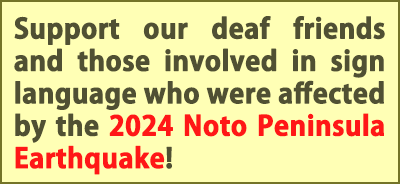Interpreter (International Sign version)
ISHIBASHI Daigo, President, Japanese Federation of the Deaf
(Japanese Sign Language version)
In Japan, sign language was once called te-mane, literally translated as “hand imitation.” This term originated from saru-mane, or “monkey imitation,” a derogatory phrase used to describe an awkward imitation. Sign language was not considered a proper language. It was looked down upon as an inferior form of communication. Our ancestors could not use sign language publicly. They would sign secretly, only in private. Deaf schools, which they attended, forbade students from using signs. If spotted, teachers would hit them as punishment. That used to be the norm.
Now, a new law, the “Act on Promotion of Measures Concerning Sign Language”, has been unanimously approved and enacted without a single opposition. As we witnessed this historic moment, we were overwhelmed with emotion, thinking of our predecessors. They have worked hard to protect sign language and to have it recognized as a language. They have dedicated themselves to raising awareness and promoting their language.
Toward legal recognition of sign language, we spent years studying situations involving sign language in Europe, the U.S., and other Asian countries. Our proposal calling for the adoption of a sign language act has been approved in all local legislatures in Japan. We have urged many local governments to enact ordinances on sign language. Moreover, we have held discussions with numerous lawmakers from all major political parties. These sustained efforts have led to this legislation. People in this country are naturally given the rights to acquire the Japanese language, learn in Japanese, learn about the language, use the language, and protect the language. The new law states that such rights must be ensured for sign language, too. This is significant. We are proud that the new act on sign language in Japan is comparable to the ones in Europe or the U.S., or may be more advanced.
I would like to express my gratitude to the Diet Members Caucus for the Promotion of Information and Communication for Adults and Children with Disabilities for their efforts to enact the Act on Promotion of Measures Concerning Sign Language. I am also grateful to all the people who have worked together in this movement.
Still, we must continue to encourage the government and related organizations to implement the measures required by law. Sign language, protected and developed by our predecessors, is our life. Protecting this life will illuminate the future of the deaf and hard-of-hearing, who will follow us. We are committed to honoring our predecessors’ hope, and realizing a truly inclusive society that ensures all five rights to acquire sign language, learn in sign language, learn about sign language, use sign language, and protect sign language.
ISHIBASHI Daigo
President, Japanese Federation of the Deaf
June 27, 2025


